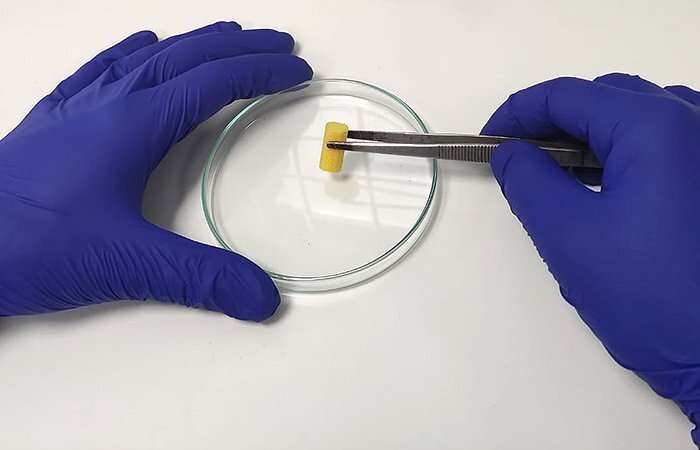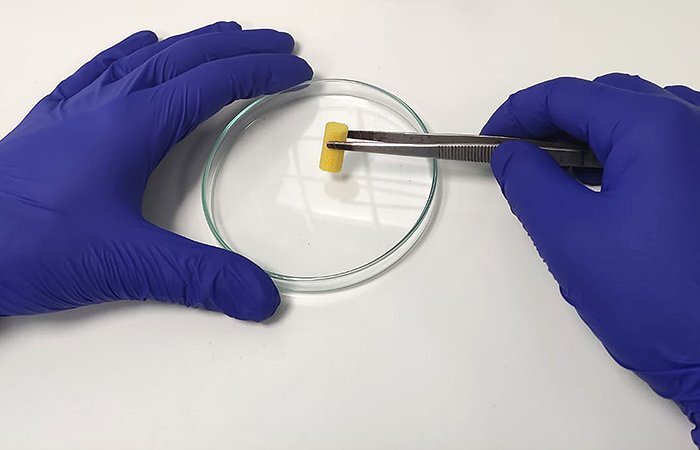
Researchers from the Bioengineering and Biomaterials Laboratory of Universidad Católica de Valencia (UCV) have developed a new porous material capable of regenerating bones and preventing infections at the same time. Tailor-made for each case using 3D printing, this biotechnological creation contains a bioactive alginate coating that manages to induce bone regeneration and destroys the bacteria that sometimes prevent bone formation from being completed.
In addition, this material is biodegradable, thanks to which it ends up disappearing from the body over time once the bone has been regenerated. The study has been carried out with small animals, in this case rabbits. The next step will be to test the material in larger animals and, eventually, in human beings.
The UCV research has been published in the journal ACS Applied Materials & Interfaces and has been carried out in collaboration with several institutions.
The team of scientists that has created this new material, led by the head of the UCV Bioengineering and Biomaterials Laboratory, Ángel Serrano, is also composed of Iván Serra (UCV Veterinary Hospital), Mar Llorens (Universidad Politécnica de Valencia), Sanjukta Deb (King’s College, London) and researchers Pablo Vercet and Virginia Chicote.
Developer of ‘revolutionary’ health technologies
The team of researchers led by Serrano is responsible, for example, for having developed the first filters capable of inactivating SARS-CoV-2 and other enveloped viruses such as influenza in less than a minute, a revolutionary health technology that allowed the creation of FFPCOVID MASK, a mask manufactured and distributed by the Valencian company Visormed. This technology was “a step forward” in protecting against the pandemic, given that conventional masks “have no antimicrobial capacity, and only prevent the virus from reaching the respiratory tract,” according to Serrano himself.
The FFPCOVID MASK not only serves the purpose of fighting the transmission of COVID-19, or a virus such as influenza, they are also useful as protection against multidrug-resistant bacteria, which cannot be destroyed with antibiotics and constitute a great risk to global health in the present and the future. After FFP2, came the less expensive surgical masks for adults and children, also capable of instantly inactivating SARS-COV-2 and antibiotic-resistant bacteria such as methicillin-resistant Staphylococcus aureus and Staphylococcus epidermidis.
New biodegradable antimicrobial materials
In addition, Serrano has patented new biodegradable materials with antimicrobial capacity for various biomedical applications such as tissue engineering to regenerate bone and other tissues. Another of his discoveries includes the demonstration of the antibacterial and antiviral capacity of carbon nanofibers in their pure state and incorporated into other materials of great industrial interest such as alginate and poly (3-hydroxybutyrate-co-3-hydroxyvalerate), commonly known as PHBV, which are non-toxic, biodegradable, biocompatible and renewable materials.
More information:
Claudio Iván Serra-Aguado et al, Engineering Three-Dimensional-Printed Bioactive Polylactic Acid Alginate Composite Scaffolds with Antibacterial and In Vivo Osteoinductive Capacity, ACS Applied Materials & Interfaces (2022). DOI: 10.1021/acsami.2c19300
Journal information:
ACS Applied Materials and Interfaces
Source: Read Full Article
